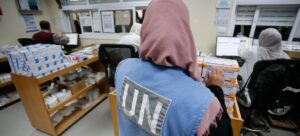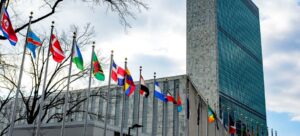The final report, led by former French foreign minister Catherine Colonna, was due to be released later on Monday. Ms. Colonna was also preparing to speak to journalists at a scheduled noon briefing in New York as Chair of the Independent Review Group on UNRWA.
“The Secretary-General accepts the recommendations contained in Ms. Colonna’s report,” Mr. Guterres’s Spokesperson said in a statement.
“He has agreed with (UNRWA) Commissioner-General Philippe Lazzarini that UNRWA – with the Secretary-General’s support – will establish an action plan to implement the recommendations contained in the final report.”
The statement concluded that “moving forward, the Secretary-General appeals to all stakeholders to actively support UNRWA, as it is a lifeline for Palestine refugees in the region.”
The review group presented interim report findings and recommendations to the UN Secretary-General four weeks ago. These included evidence that UNRWA had “a significant number of mechanisms and procedures to ensure compliance with the humanitarian principle of neutrality” although “critical areas…still need to be addressed,” Mr. Guterres’s office noted at the time.
The review panel – working with respected research organisations the Raoul Wallenberg Institute, the Michelsen Institute and the Danish Institute for Human Rights – announced that it would proceed with developing concrete and realistic recommendations to strengthen and improve the agency.
Gaza, West Bank violence unabated
The development came amid reports of further Israeli bombardment across Gaza at the weekend and concerning levels of violence in the West Bank.
UNRWA
In Rafah, the southernmost city in the Gaza Strip, the UN sexual and reproductive health agency, UNFPA, reported on Monday that a baby had been saved by emergency Caesarean section after its mother was critically injured in an airstrike and later died.
“Doctors in Gaza were able to save the life of the baby from the womb of the mother as she passed away from the head injury she’d sustained,” said Dominic Allen, UNFPA Representative for Palestine. The mother was 30 weeks pregnant when she died, along with her husband and the baby’s siblings, Mr. Allen noted.
Waiting for bombs to fall
In Geneva, the UN Special Rapporteur on the right to health highlighted the huge toll on mental health that recent months and decades of violence have taken on the enclave’s besieged population and medical professionals.
“Imagine living under the constant anticipation of a bomb or a gun, or being shot while you’re trying to get food or water or play. That is in itself a form of violence,” said Dr. Tlaleng Mofokeng. “To anticipate that your life could be extinguished in any moment and for children to grow up with that level of trauma is not normal. But, for decades, that has been normalised for the people of Occupied Palestinian Territory.”
On a daily basis, life continues to worsen for ordinary Gazans after nearly seven months of constant Israeli bombardment and a ground operation, launched in response to Hamas-led terror attacks in southern Israel that left some 1,200 dead and more than 250 taken hostage.
A child dies every 10 minutes in the enclave, UNRWA said at the weekend, in a fresh call to end the violence and allow desperately needed humanitarian aid into the enclave.
To date, Gazan health authorities report that more than 34,000 Palestinians have been killed and some 77,000 wounded in Israeli attacks on Gaza since 7 October.
Underscoring the looming health dangers from warmer spring conditions, UNRWA expressed renewed concerns over poor waste management and disease. In a post on X, formerly Twitter, Scott Anderson, Senior Deputy Director of UNRWA Affairs in Gaza, warned that substandard water and sanitation were far below what the population needed to stay healthy.

















